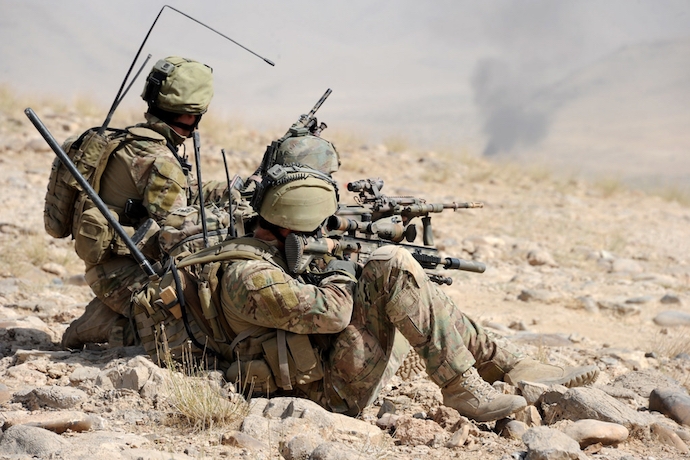
Longform
The Question of Jurisdiction: Alleged Australian War Crimes in Afghanistan
This article examines issues raised by the “Brereton Report” from the Inspector-General of the Australian Defence Force regarding possible war crimes committed by Australian soldiers who served in Afghanistan. This article investigates the issue of jurisdictional appropriateness, comparing the rationale for investigating and prosecuting the alleged offences set out in the Brereton Report within the Australian jurisdiction with the prospect of investigating and prosecuting these allegations under the jurisdiction of the International Criminal Court (ICC).
The article argues that Australia should pass jurisdiction to the ICC to investigate and prosecute alleged war crimes in a just, impartial, and expert manner, free from actual or perceived bias. It suggests that conducting these prosecutions within Australia will expose it to allegations of conflict of interest. It proposes that Australia’s legitimacy and credibility in the international community will be enhanced by transferring jurisdiction. And that the benefits of doing so outweigh any potential risks presented by the loss of jurisdictional control.
It also suggests that substantive benefits for the international rules-based order would emanate from transferring jurisdiction by creating a precedent for the legitimate, impartial administration of war crimes. Though it is secondary to the article’s main argument, it proposes that Australia’s transferring jurisdiction will enhance the ICC’s credibility.
Australia’s participation in the war in Afghanistan began in 2001 as part of a U.S.-led coalition. This military operation aimed to disrupt and defeat Al Qaeda and eliminate the Taliban regime. The Brereton Report found credible evidence of 39 murders of civilians or prisoners by members of the Australian military and that these unlawful killings were covered up by officials. According to the Brereton Report, 25 ADF personnel are implicated in the killings, as either perpetrators or accessories, between 2009 and 2013.

Australian versus ICC jurisdiction
War crimes are a discrete part of international humanitarian law. They are essentially serious breaches of the rules of customary law (the jus in bello) and treaty law regarding international humanitarian law. These include grave breaches of the laws of armed conflict, especially the Geneva Conventions, concerning willful killing, torture, or inferior treatment, willfully causing great suffering or serious injury to body or health. It is suggested that if Australia proceeds in its present course of investigating and prosecuting the alleged offences within Australia, it risks being accused of bias, lack of transparency, conflict of interest, and questioning the legitimacy of the outcomes.
The ICC aims to adjudicate and penalise the parties and their citizens responsible for acts against another party and help prevent crimes under international humanitarian law. The ICC acts neutrally, without state bias. Hence, if the ICC deals with the alleged offences committed by the ADF personnel, the proceedings will be perceived as more objective and legitimate than those conducted in Australia. Australia’s passing jurisdiction to the ICC, even though it is not compelled to do so, would demonstrate its commitment to transparency, accountability, fairness, and the rule of law.
The general principle of law, nemo judex in causa sua, states that no one should be the judge of a case in which it is involved. This principle protects states from actual or perceived conflict of interest. It would be most fully observed and promoted if the matter is transferred from Australia to the ICC. The ICC would ensure fairness in the matter by following several fundamental principles that relevantly include: It respects national sovereignty in the exercise of criminal jurisdiction; ICC judges conduct judicial proceedings and ensure their fairness; the prosecution is independent; defendant’s rights are upheld; participating victims and witnesses are protected.
These principles ensure that the ICC deals with matters fairly and transparently and mitigates potential allegations of conflict of interest. For these reasons and those set out below, transferring jurisdiction represents the appropriate action and does not pose an unreasonable risk for Australia.
Reasons for transferring jurisdiction
‘Conflict of interest’ may be defined as a situation in which a person or institution, having a duty in respect of a matter, also has a personal or vested interest in it, financial, political, or other. Accordingly, in investigating and prosecuting the alleged offences set out in the Brereton Report, Australian investigators, prosecutors, and courts may be perceived to have a conflict of interest. This conflict subsists in the actual or perceived interest that Australian authorities may have in protecting the reputation of Australia and members of other Australian institutions, such as the military. Real potential exists, intentionally or unconsciously, for Australian authorities to exempt, excuse, or overlook criminal acts when investigating alleged offences committed by members of the ADF, a service possessing iconic status and an emotional place within the Australian community and culture.

Supporting the idea that bias may be an issue for Australian authorities is evidence that suggests that Australia was blind to a steady flow of disturbing information and reports of war crimes emanating from Afghanistan for many years before the Brereton Report was commissioned.
Arguments have been presented that one significant reason for this blindness was that the Australian culture mythologises the ANZAC legend. Thus, relevant authorities were unable to view objectively and effectively manage the reports of atrocities being committed. For this reason, it is submitted that the risk of a conflict of interest manifesting when holding ADF members to account inside Australia ought to be avoided. This would protect the reputation and standing of Australia as an honest ‘international actor and citizen.’
Further, the ICC’s neutrality would ensure that the potential for bias is negated and that proceedings are carried out in a just, procedurally fair, and objective manner. In contrast to Australia’s conducting the proceedings, if the ICC conducts them and finds Australian personnel not guilty, there will be no question of a conflict of interest or bias influencing the decision. The ICC does not have any municipal or intra-state authority and does not act as an appellate authority. Its specific and only responsibility is for the prosecution of crimes under international humanitarian law. The specificity of its jurisdiction and experience in these matters has made it a robust, expert institution in investigating and prosecuting such offences.
The expertise and specific focus of the ICC, in contrast to Australia’s limited experience in dealing with these matters, form another reason that Australia ought to allow the ICC to investigate, arrest, and try the alleged offenders. If Australia investigates and hears the charges against its defence personnel, it risks allegations of actual or perceived bias. This risk is more real, given that the Inspector-General of the Australian Defence Force disclosed that such bias was indicated during the investigation, gathering, and analysing of the Brereton Report’s evidence. To demonstrate to other nations that Australia is beyond reproach, it is imperative that Australia transfer jurisdiction to the ICC.
The advancement of international justice
Positive aspirations for the international system of justice and the legitimacy of the ICC would be augmented by Australian authorities going beyond the Australian domestic jurisdiction and assisting the ICC in this matter. The Brereton Report already raised the risk of impropriety and potential bias. For example, no evidence has been reported regarding breaches of the customary law of command responsibility. Such charges are challenging to sustain for distinct reasons. However, to prevent questions that may arise regarding impropriety or conflict of interest, it is again submitted that Australia should pass the responsibility for investigating culpability for these alleged war crimes, including command responsibility, to the ICC.
General principles of international law also apply in this case. These principles include good faith, ethical conduct, the impartiality of judges, and res judicata. Res judicata means that proceedings may not be reopened after they are concluded by the same, or a different court. Therefore, they must be conducted in a manner that will not require their subsequent reopening. This creates the additional risk that if alleged offenders are acquitted due to bias, there is no mechanism for retrying or appealing the decisions. The ICC is also subject to the principle of res judicata. However, because the ICC is unlikely to display the bias that Australian authorities may do, this provides another reason it is appropriate to transfer jurisdiction to the ICC.
The principle of good faith also applies to the ICC, and its independence and impartiality assist these matters being dealt with bona fide. Suppose Australia is unwilling to transfer the matter to the ICC. It will be obliged to take extraordinary measures such that the other party to the action (Afghanistan) can be assured that it is investigated impartially and in good faith. Australian authorities will have to impose an exceptionally high standard of good faith (uberrima fides). The legal infrastructure required to achieve this standard is complex and challenging to build, and Australia lacks the framework and impartiality of the ICC. This would also be resolved by transferring jurisdiction.
Implications of transferring jurisdiction
There are four significant implications of Australia’s transferring jurisdiction. First, Australia’s legitimacy and credibility in the international community will be enhanced, while little or no long-term harm will be done to its reputation. Second, it resolves the issue of any conscious or unconscious bias and conflict of interest that may potentially taint proceedings if conducted by Australia. Third, Australia would demonstrate international leadership by displaying trust in the ICC by transferring jurisdiction. It would also generate a significant precedent and potential model for other nations to follow when faced with similar issues and decisions in the future. It would also contribute to stability and perceived equity in the international jurisdiction, affording Afghanistan a full measure of respect. Finally, Australia’s placing trust in the ICC would bolster the Court’s credibility. This would go some way to remedying the perception that international law is a mere Western tool, especially in the non-West.
***
This article argues that the investigation and prosecution of alleged war crimes committed by members of the ADF in Afghanistan will be most effectively undertaken by the ICC rather than by Australian authorities. This will significantly diminish or obviate potential criticisms of Australia based on any real or perceived bias, lack of objectivity, bad faith, or conflict of interest.
The article demonstrates that if the alleged offences are investigated and prosecuted by the authorities in Australia, questions are likely to arise regarding the presence of an actual or perceived conflict of interest. This will cause reputational harm to Australia and diminish its international standing. In contrast, passing jurisdiction to the ICC will resolve these issues, increase the ICC’s credibility, and engender trust in it.
This article contends that the ICC provides the most coherent, neutral, and credible jurisdiction in which to conduct the proceedings in question while eliminating the risk of conflict of interest or bias, thereby protecting Australia from reputational harm. Australia can assist itself and, in the process, enhance the role and legitimacy of the ICC. The ICC might then independently and impartially hold Australia’s Defence Force accountable for the serious allegations against it and its members.
